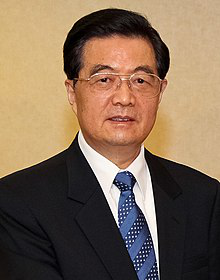

General Secretary of the Chinese Communist Party
21 December 1942 Taizhou, Jiangsu, Republic of China
-
15 November 2002 – 15 November 2012
Former General Secretary of the Chinese Communist Party In this Chinese name, the family name is Hu. Hu Jintao胡锦涛 Hu in November 2011General Secretary of the Chinese Communist PartyIn office 15 November 2002 – 15 November 2012Preceded by Jiang ZeminSucceeded by Xi JinpingPresident of the People's Republic of ChinaIn office 15 March 2003 – 14 March 2013PremierWen JiabaoVice President Zeng Qinghong Xi JinpingPreceded by Jiang ZeminSucceeded by Xi JinpingChairman of the Central Military CommissionIn office State Commission: 13 March 2005 – 14 March 2013 Party Commission: 19 September 2004 – 15 November 2012DeputyXi Jinping Guo Boxiong Xu Caihou Cao GangchuanPreceded by Jiang ZeminSucceeded by Xi JinpingFirst Secretary of Secretariat of the Chinese Communist PartyIn office 19 October 1992 – 15 November 2002General Secretary Jiang ZeminPreceded by Qiao ShiSucceeded by Zeng QinghongVice President of the People's Republic of ChinaIn office 15 March 1998 – 15 March 2003PresidentJiang ZeminPreceded by Rong YirenSucceeded by Zeng Qinghong Personal detailsBorn (1942-12-21 ) 21 December 1942 (age 78) Taizhou, Jiangsu, Republic of ChinaPolitical partyCommunist Party of ChinaSpouse(s)Liu YongqingChildrenHu Haifeng Hu HaiqingFatherHu Jingzhi (胡静之 )ResidenceZhongnanhai (former)Alma materTsinghua University (BS)ProfessionHydraulic engineer Central institution membership 1992–2012: 14th, 15th, 16th, 17th Politburo Standing Committee 1992–2002: Secretary (first-ranked), 14th, 15th, Central Secretariat 1992–2012: 14th, 15th, 16th, 17th Politburo 1985–2012: 12th, 13th, 14th, 15th, 16th, 17th Central Committee 1982–1985: 12th Alternate Membership of the Central Committee 1988–2013: 7th, 8th, 9th, 10th, 11th National People's Congress Other offices held 1999–2005: Vice Chairman, State Central Military Commission 1999–2004: Vice Chairman, Party Central Military Commission 1998–2003: Vice President of the People's Republic of China 1993–2002: President, Central Party School 1988–1992: Party Committee Secretary, Tibet Autonomous Region 1985–1988: Party Committee Secretary, Guizhou province 1983–1985: First Secretary, Communist Youth League 1983–1985: President, All-China Youth Federation Paramount Leader of the People's Republic of China ← Jiang Zemin Xi Jinping → Hu Jintao"Hu Jintao" in Simplified (top) and Traditional (bottom) Chinese charactersSimplified Chinese胡锦涛 Traditional Chinese胡錦濤 TranscriptionsStandard MandarinHanyu PinyinHú Jǐntāo, Hú Jǐntáo Wade–GilesHu2 Chin3-t'ao1, Hu2 Chin3-t'ao2 IPA HakkaRomanizationFù Kím-thàu Yue: CantoneseYale RomanizationWùh Gám-tòuh JyutpingWu4 Gam2-tou4 IPA Southern MinHokkien POJÔ͘ Gím-tô Tâi-lôÔo Gím-tô Eastern MinFuzhou BUCHù Gīng-dò̤ Hu Jintao (/h uː dʒ ɪ n ˈ t aʊ / ; Chinese: 胡锦涛 ; pinyin: Hú Jǐntāo ; Mandarin pronunciation: ; born 21 December 1942) is a Chinese retired politician who was General Secretary of the Chinese Communist Party (CCP) from 2002 to 2012, President of the People's Republic of China (PRC) from 2003 to 2013, and Chairman of the Central Military Commission (CMC) from 2004 to 2012. He was a member of the CCP Politburo Standing Committee, China's de facto top decision-making body, from 1992 to 2012. Hu is considered to have been the paramount leader of China from 2004 to 2012. Hu participated in the Chinese Communist Party (CCP) for most of his career, notably as Party Committee Secretary for Guizhou province and the Tibet Autonomous Region and then later First Secretary of the CCP Central Secretariat and Vice-President under former leader Jiang Zemin. Hu was the first leader of the Communist Party from a generation younger than those who participated in the civil war and the founding of the republic. During his term in office, Hu reintroduced state control in some sectors of the economy that were relaxed by the previous administration, and was conservative with political reforms. Along with his colleague Premier Wen Jiabao, Hu presided over nearly a decade of consistent economic growth and development that cemented China as a major world power. He sought to improve socio-economic equality domestically through the Scientific Outlook on Development, which aimed to build a "Harmonious Socialist Society" that was prosperous and free of social conflict. Under his leadership, the authorities also cracked down on social disturbances, ethnic minority protests, and dissident figures which also led to many controversial events such as the unrest in Tibet and the passing of the Anti-Secession Law. In foreign policy, Hu advocated for "China's peaceful development", pursuing soft power in international relations and a corporate approach to diplomacy. Throughout Hu's tenure, China's influence in Africa, Latin America, and other developing regions increased. Hu possessed a modest and reserved leadership style. His tenure was characterized by collective leadership and consensus-based rule. These traits made Hu a rather enigmatic figure in the public eye. His administration was known for its focus more on technocratic competence than persona. At the end of his tenure, Hu won praise for retiring voluntarily from all positions. He was succeeded by Xi Jinping.

We use cookies
We use cookies and other tracking technologies to improve your browsing experience on our website, to show you personalized content and targeted ads, to analyze our website traffic, and to understand where our visitors are coming from. Privacy Policy.